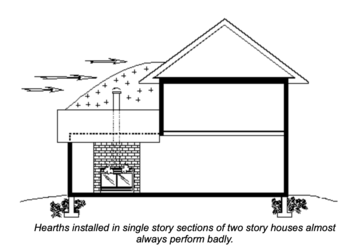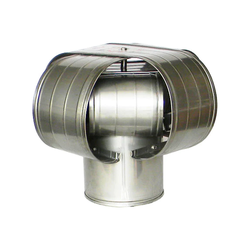We've been in our home for two winters now, first with an old Buck 27000 and then a professionally installed Lopi Large Flush with no cat. Both of them were on the first floor of the house and ran their flue through a mason chimney. The Lopi installers actually added a couple more feet to the pipe so now it's sticking around 8 or so feet above the roof where it comes out and maybe 6 ft above the peak. Above part of the first floor where there is not the stove is a second story with an attic area. Think essentially two 800 sqft rooms side by side with one having another 600 sq ft stacked on top. Best I can tell the new install is double walled pipe, the previous was a terrifying homebuilt thing that we didn't know the extent of until the new one was installed.
Recently this winter (#3) we've had issues with our CO detectors going off in various places around our house in the twilight hours (4-6) after burning all night. We have an old 1930's home that has had many renovations through the years but is still a pretty poorly insulated thing with air leaks. Twice now we have had the upstairs area go off reading between 40-60 (annoyingly, the detectors take hours to alarm at these levels) and once at the detector right next to the stove (90 ppm). For the upstairs one to go off, air would have to flow from the stove and past two detectors.
They are going off sparingly enough, and spread around, that I am having trouble figuring out the issues here. From what I have read in other threads, it seems that maybe there is a inversion of the draft in the flue happening when the fire has really burned down. The woodstove is the only combustion heat source we have, we have two small wall heaters for a couple side rooms but they really can't manage the whole house. We don't have any automatic fans that come on. Our wood has been sitting covered for a year and a half now and measures around 10-12% on a fresh split with the grain and we have very little coals burried in the ashes in the morning. I try to run the stove pretty hot before bed and don't close down the air all the way so that it fully burns down.
Only changes I can think of in the house since last winter is a new roof over all of it and having the stove cleaned. He said it looked great and that we had pretty low creosote from the previous winter.
Any ideas for how to diagnose why we are suddenly having trouble with this would be great.
Recently this winter (#3) we've had issues with our CO detectors going off in various places around our house in the twilight hours (4-6) after burning all night. We have an old 1930's home that has had many renovations through the years but is still a pretty poorly insulated thing with air leaks. Twice now we have had the upstairs area go off reading between 40-60 (annoyingly, the detectors take hours to alarm at these levels) and once at the detector right next to the stove (90 ppm). For the upstairs one to go off, air would have to flow from the stove and past two detectors.
They are going off sparingly enough, and spread around, that I am having trouble figuring out the issues here. From what I have read in other threads, it seems that maybe there is a inversion of the draft in the flue happening when the fire has really burned down. The woodstove is the only combustion heat source we have, we have two small wall heaters for a couple side rooms but they really can't manage the whole house. We don't have any automatic fans that come on. Our wood has been sitting covered for a year and a half now and measures around 10-12% on a fresh split with the grain and we have very little coals burried in the ashes in the morning. I try to run the stove pretty hot before bed and don't close down the air all the way so that it fully burns down.
Only changes I can think of in the house since last winter is a new roof over all of it and having the stove cleaned. He said it looked great and that we had pretty low creosote from the previous winter.
Any ideas for how to diagnose why we are suddenly having trouble with this would be great.




